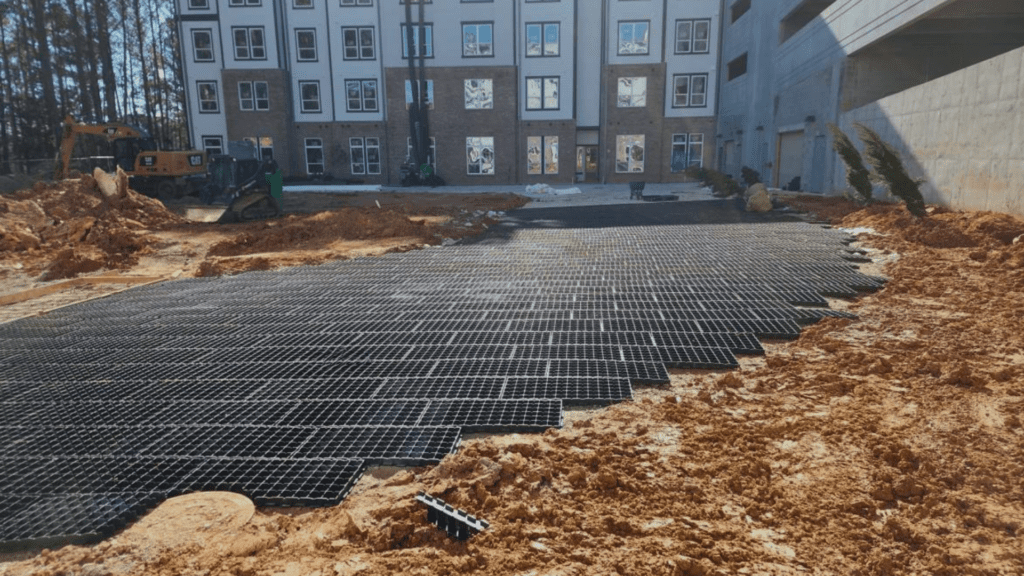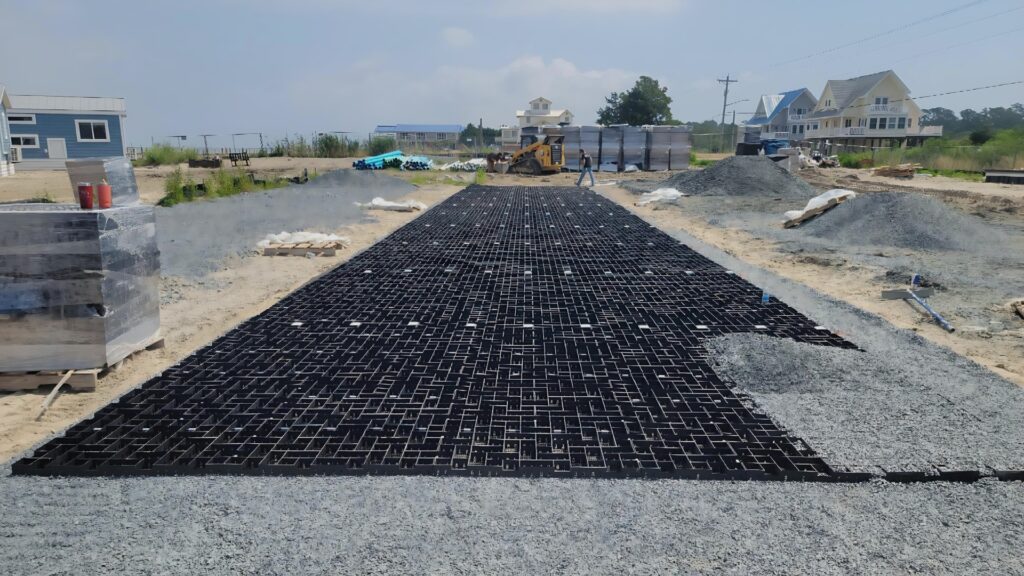17 FebPermeable Paving Solutions
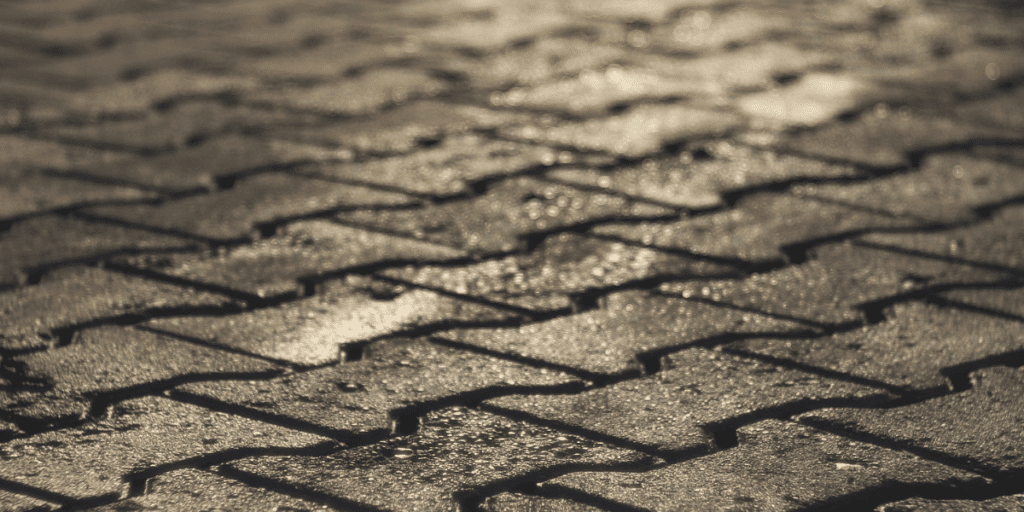
Managing stormwater is a critical concern for municipalities, enJugineers and developers. As our communities grow and develop, naturally permeable surfaces like grass and gravel are replaced with impermeable materials like concrete and asphalt.
Permeable paving is a green infrastructure solution that allows you to construct a strong and stable surface without sacrificing permeable space.
Jump to Comparing Permeable Paving Solutions
What is Permeable Paving?
Permeable paving is an alternative to traditional paving that intends to improve stormwater infiltration. This environmentally friendly paving technique is a favorable way to increase the total permeable area on a development while still supporting foot and vehicular traffic. Permeable paving, however, is not meant to be a substitution for traditional paving on every site.
Permeable Paving vs. Traditional Paving
The difference between permeable paving and traditional paving is the porosity of the paving material.
Traditional paving applies asphalt, concrete or pavers to a graded base in order to create a smooth road, driveway, path or parking lot.
Paving with these products, however, increases the impermeable surface area. Runoff doesn’t infiltrate asphalt and concrete but rather flows over the hard surface.
Permeable paving, on the other hand, incorporates materials that absorb stormwater runoff.
Permeable products include pavers, porous paving systems and cellular confinement systems. Each product is designed to improve infiltration and increase the permeable surface area.
Porous paving systems and cellular confinement systems can be filled with stone, soil and natural vegetation. These materials naturally absorb runoff while also creating a stable base for traffic. These environmentally friendly options are not intended to be a direct substitution for all paving projects, however, you will find that they do have proven success for a wide variety of applications.
Permeable Paving Options
Although many permeable paving products appear similar, each product has a unique design that distinguishes its performance from others.
We’re going to break down four of our favorite permeable paving options to help you decide which product works best for you.
| Key Details | PaveDrain | GEOPAVE | GEOBLOCK | GEOWEB |
|---|---|---|---|---|
| Size | 12″ x 12″ x 5.65″ block | 40″ x 20″ panel, 2″ deep cells | 40″ x 20″ panel, 1.2″ or 2″ deep cells | 3″, 4″, 6″ and 8″ deep cells. Various panel sizes |
| Design | Articulated concrete block with arched storage chamber | Open cell rigid panel with mesh bottom to confine aggregate | Open cell rigid panel with open bottom cell to support grass establishment | Open cell flexible panels with open bottom to be infilled with stone or topsoil |
| Connection | Open joints | U-Clips | Interlocking tabs | Anchors and ATRA Keys |
PaveDrain
PaveDrain is a permeable articulated concrete block that interlocks to create a permeable paving system. PaveDrain is not a traditional permeable paver.
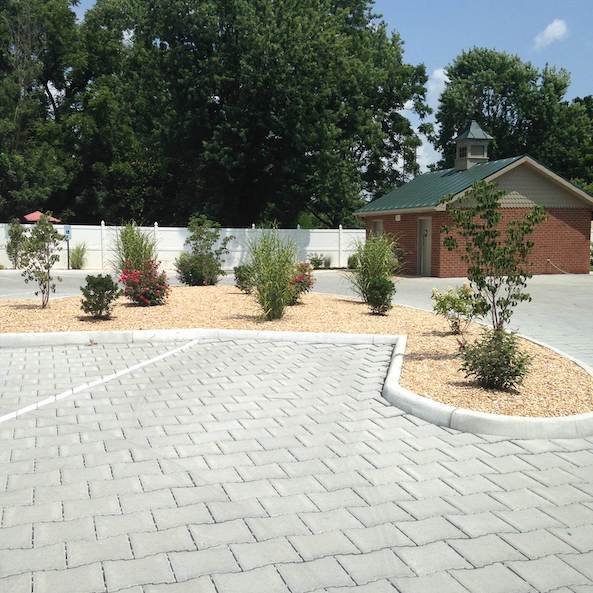
Applications for PaveDrain
- Parking lots
- Fire lanes
- Street parking lanes
- Sidewalks
- Cart paths
- Emergency access roads
- Residential driveways
Paver Size
12″ x 12″ x 5.65″
Why We Like PaveDrain
We love the product’s arch design that maximizes stormwater storage but the stormwater monitoring system is what truly distinguishes PaveDrain. The P4 INFIL-Tracker and P4 Rain-mX monitoring system reports the infiltration rate and the volume of captured stormwater runoff in order to accurately document infiltration success and guide maintenance requirements.
We love the product’s arch design that maximizes stormwater storage but the stormwater monitoring system is what truly distinguishes PaveDrain. The P4 INFIL-Tracker and P4 Rain-mX monitoring system reports the infiltration rate and the volume of captured stormwater runoff in order to accurately document infiltration and guide maintenance requirements.
There are several characteristics that distinguish PaveDrain from traditional permeable pavers.
First, PaveDrain blocks are big blocks (12” x 12” x 5.56”) that each weigh 50 pounds and are manufactured in a variety of colors. Each block has an arched internal storage chamber that collects stormwater runoff.
Additionally, the joints in between PaveDrain blocks are left open. Most permeable paver joints, on the other hand, are filled with aggregate. The open joints allow water to infiltrate quickly. If the joints become clogged with debris, a vacuum truck can clean out the build-up and restore the joints to nearly new form. Smaller projects can be cleaned out with an air compressor and wand attachment.
Finally, PaveDrain has a HS-25 load rating and a compressive strength of 4,000 psi. This means it can withstand heavy loads like fire trucks and some equipment.
GEOPAVE® Gravel Paver
This aggregate paving system is manufactured by Presto Geosystems, a leading provider of innovative geosynthetic and drainage products.
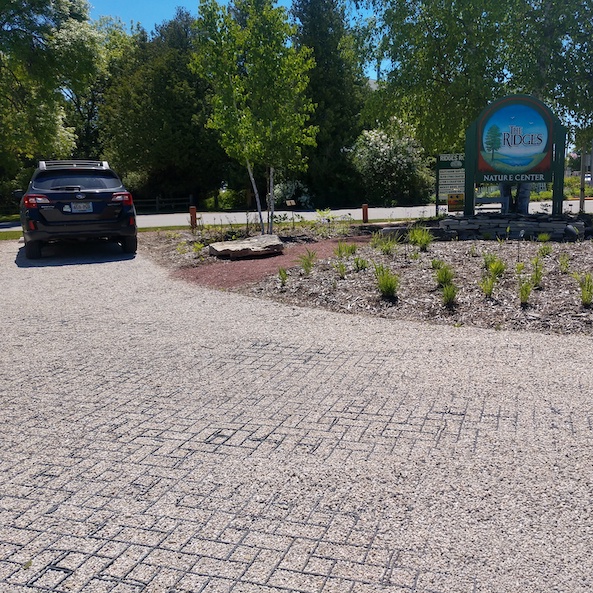
Applications
GEOPAVE works for light, medium and heavy duty applications. Common applications include:
- Emergency and Utility Access Lanes
- Parking Areas
- Pedestrian Trails & Walkways
- Driveways
- Shoulders & Medians
Sizes
- 2″ x 20″ x 40″ (D x W x L)
Why We Like the GEOPAVE Paver
GEOPAVE units feature a herringbone design with a mesh cell bottom that results in structural support for heavy traffic. The 20-inch by 40-inch paver panels easily connect together and are secured by a metal U-clip.
If you’re specifying GEOPAVE for permeable parking lots, add snap delineators for high visibility parking indicators.
Gravel filled porous pavers offers excellent stormwater infiltration which can result in earning LEED credits.
GEOBLOCK® Grass Porous Pavers
GEOBLOCK is very similar to the GEOPAVE. Both products are manufactured by Presto Geosystems, snap together for easy install and are made of recycled polyethylene.
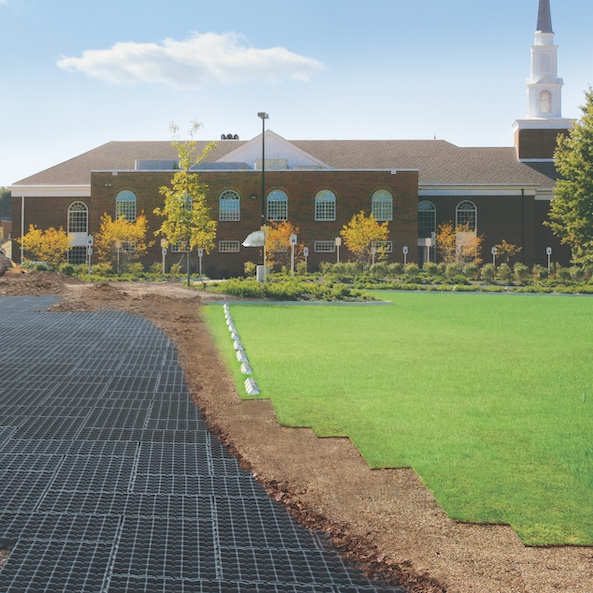
Applications
Choose GEOBLOCK for commercial applications like fire lanes and overflow parking because the porous paver offers superior load distribution when subjected to high stress and heavy loads.
- Emergency and Utility Access Lanes
- Overflow Parking Areas
- Road Shoulders
- Pedestrian Trails
- Greenways
Paver Size:
1.2″ x 20″ x 40″ (D x W x L)
Why We Like GEOBLOCK
GEOBLOCK panels interlock which makes installation quick and easy. Each paver panel is rigid but contours to the ground.
Units of GEOBLOCK Grass Pavers ship in stackable pallets with 92 units per pallet. Palletized products are easier to ship and easier to store.
GEOBLOCK grass pavers also require 2 -3 times less base than other drivable grass products. The recommended engineered base is 30% topsoil and 70% aggregate. When successfully installed and vegetated, drivable grass should be achieved in about 2 to 3 weeks.
Geocell
Geocell is a cellular confinement system that is specified for many purposes including permeable paving.
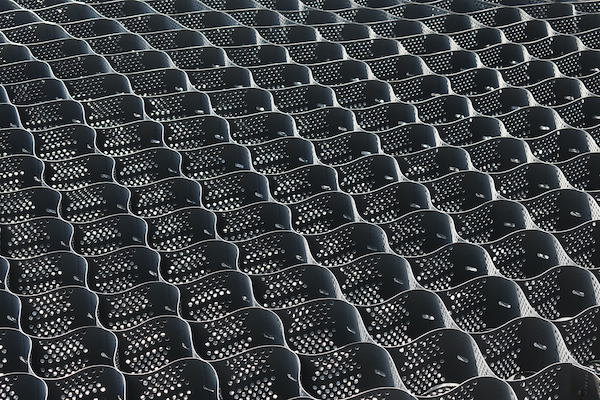
Applications
- Slope stabilization
- Swale stabilization
- Erosion control
- Soil and ground stabilization
- Green parking
- Equipment yards
- Access roads
Why We Like Geocell
Geocell cellular confinement systems are priced very competitively for permeable paving. The cell’s large openings also make it easy for grass to grow and establish a root system.
Our Geocell is manufactured from HDPE. This permeable paving system design, however, is much more flexible than the aforementioned products.
Geocell ships in panels of flexible strips that you pull apart to expand during installation. The panels are secured with ATRA Keys, ATRA Speed Stakes or steel stakes with ATRA Clips. Once the cellular confinement system is installed, fill the cells with soil, stone, sand, concrete or grass.
Get Pricing and More Information
If you need further information or would like to request pricing for any of these products, please contact our sales team.


